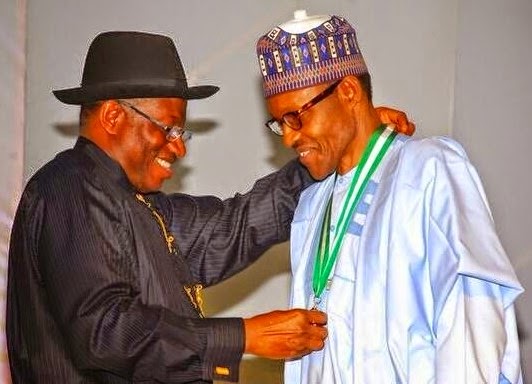NIGERIA 2015: A SEASON OF POLITICAL VOLTRONS BY GIMBA KAKANDA
I always feel my age telling on me whenever I have to explain what Voltron is, what it was to us as kids in the second half of the 1980s and the early 1990s, to my younger friends. Voltron, which has now become an everyday lexicon in Nigeria’s social media communication, now used to mean an “uncritical defender”, was a “character” – a giant robot piloted by space explorers – in an animated television series named “Voltron: Defender of the Universe”. The series was aired on Nigerian Television Authority in its years of memorable monopoly. It amused a generation that couldn’t even imagine today’s magnetic obsession with the virtual world, a syndrome that has now turned some of us into anti-social beings with poor grasp of the surrounding social reality.
In tracking communication by, and interactions among, various political camps in the media to understand the stance of our “virtual intellectuals”, which is hardly a reflection of realities offline, on the February 14 elections, I identified three Voltrons: two already known, and the third only tentatively named. The two known Voltrons are partisan supporters of the two major parties who have evolved from being Defenders of their party’s Universe to those of the presidential candidates fielded by the parties. These are the Buharists and the Jonathanians, supporters of PDP’s Dr. Goodluck Jonathan and APC’s General Muhammadu Buhari, tangled in political voltronism—a disorderly campaign for promoting the interests of their principal while damaging that of his opponents. Political voltronism is an aggressive show of intellectual disability in the defence of one’s political principal, aspirant or paymaster.
Buharism, a form of political voltronism, is a political advocacy that promotes the virtues of a man and romanticizes his flaws, almost elevating him to the status of a deity, while being aggressively against his critics. Its counter-advocacy is Jonathanianism, which is a defence of an unpopular political leader by a section of a disgruntled people, out of an unconvincing belief that the alternative is not better or just as flawed.
The third group is Supra-Nigerianism; this, in my lexicography, is an act of self-disenfranchisement by hopeless and holier-than-thou critics on the grounds of all political aspirants being incompetent to lead. The real contest in our quest for change or insistence on sustaining the status quo is the choice between Jonathan and Buhari, for the Supra-Nigerian is either a hypocritical or absolutely delusional change agent. While the Supra-Nigerian challenges uncritical followership of these two leaders, there’s also a need to understand that no political camp would ever agree that it’s indeed wrong or wash its dirty linen in public.
So, no, we can’t afford being neutral. That’s the peak of silliness for someone dissatisfied with the status quo or advocating change. Neutrality isn’t also an option for the defenders of the status quo. Being political isn’t partisanship. Perhaps this awareness is the reason the Supra-Nigerian Voltron, for its inability to differentiate between the political and the partisan, allow itself to be a victim of the German intellectual, Bertolt Brecht’s, perceptive outburst, puncturing their indecision as political illiteracy, that they are the “worst illiterate”. And of course, Brecht wasn’t harsh when he dismissed the “political illiterate”, of whom the Supra-Nigerian is one, as an “imbecile (who) doesn’t know that, from his political ignorance is born the prostitute, the abandoned child, and the worst thieves of all, the bad politician, corrupted and flunky of the national and multinational companies.”
But Brecht doesn’t mean anything to the Supra-Nigerian. The Supra-Nigerian still prefers to sit on the fence of his dark and dry house, tweeting, facebooking, in the din of a generator set, unknown to him that activating his political education could bring electric power and water to his house, and also a network of good roads and functional institutions. Our attitudes to unimpressive government policies and decisions are the reasons some would even dismiss anti-government causes as partisan, instead of what it really is: political.
The comedy of our political system now is, after a term in power, the incumbent has nothing to offer as the reason it deserves another term aside from petty ridiculing of the opposition, even stooping so very low to question a claim that a prominent challenger’s certificates is in the custody of an organization that’s answerable to the same government. This is a clear confirmation that this country is being run by clowns with embarrassingly low IQ!
What the ongoing agitation for change means is, any party that finds itself in power now – and a narrow escape this may be – even if PDP again, will be somewhat more responsible. Even though the incumbency factor may still work in favour of Jonathan/Sambo ticket, for the bulk of our votes may be from a people understandably incapable of resisting financial inducements, I doubt if there was ever a time in our political history that the future of a ruling party was this bleak. Yes, it’s not Buhari that can change Nigeria. Even Mandela couldn’t have changed it. What would change Nigeria is nothing other than YOUR will to be a political animal. May God save us from us!
By Gimba Kakanda


